|
no. 3 july - september 2004 Carmel in Philippines Becomes General Commissariat
A fter 48 years of Carmelite presence in the Philippines, the Prior General with the consent of the General Council of the Order approved the creation of a General Commissariat of the Philippines. The Prior General issued the decree of canonical erection on July 16, 2004.Founded by the Dutch Province in 1950ís when then Prior Provincial Brocard Meyer, O. Carm., traveled to the Philippines looking for opportunities to establish the Order in the islands. Eventually the Province accepted the invitation of the Bishop of Dumaguete to be responsible for the northern part of the Diocese of Negros Island. Carmelites Richard Vissers, Wirenfried Wiesters, and Theodulph Vrakking arrived on the island on May 16, 1958. The beginning of the mission of the Dutch Province in the Philippines is related to the political situation in the Indonesian Republic in the late 1950ís. At that time it was difficult for Dutch Carmelites to enter the Indonesian Republic because of the Indonesian struggle for independence against the Netherlands, the colonizer of the Indonesian archipelago. At the same time the Prior Provincial was looking for a place near the Indonesian Republic where the Dutch Carmelites who were living in Indonesia could go if there were an emergency and they had to leave Indonesia quickly. A seminary was established in 1965 in Escalante and by the late 1960ís, the Carmelites were part of the Dioceses of Surigo, Manila, and Iligan. During the 1970ís the Carmelites continued to be active in parish ministry, schools, colleges, and universities, as well as in social action groups and workersí programs. In the 1980ís there was a dramatic increase in the number of lay people associated with the Order and the Titus Brandsma Center in Manila was opened. Since the 1990ís the Provincial Commissariat has been working towards becoming a General Commissariat. A series of strategies was put in place to make that possible. The Prior General and his Council approved the Philippine General Commissariat at their 130 th session on May 28, 2004. Antonio de la Cruz, elected as Commissary Provincial, was appointed as the first General Commissary of the Commissariat of the Philippines. Christian Buenafe, Reynold Caigoy, and Roberto Noel Rosas will serve as Councilors. All other commissary officials have been re-appointed. The Prior General has convoked the first Chapter of the Commissariat to begin on February 14, 2005. The appointed Commissary officials will hold office until then.In a letter to the members of the Commissariat, Antonio de la Cruz urged each to participate in a personal as well as communal preparation for this historic step. The program, Spiritual Preparation Towards Independence, is a process where discovery, rediscoveries, retrievals, and dispositions, appreciations, and reaffirmations, lessons and corrections, reflections, and prayers, hopes and wishes are shared and deepened.
Fourteen Lay Associates have made a private commitment. According to the Constitutions (#177), the General Commissariats are one of three structures under the direct jurisdiction of the Prior General. The General Commissary is an ordinary, with all the faculties which canon law confers upon them (#209). The creation of a General Commissariat is considered a step towards becoming a Province. The Constitutions (#182) currently requires four canonically erected houses and about forty solemnly professed religious with adequate means of support. Other General Commissariats in the Order at this time are "La Bruna" in the area of Naples, Italy and that of "Lusitaniae" which includes all of Portugal.
Some Reflections on the Creation of the Philippine General Commissariat "The dream and pursuit for independence started in the 1994 Convention of the Commissariat and we made a six- year plan to become independent. We presented our plan to the Dutch province and to the Chapter in the Netherlands and it was unanimously supported by the mother province," states Antonio de la Cruz, the first General Comissariary of the Philippines. "We want to build a contemplative, prophetic and Filipino Carmel. That is our immediate goal and it involves each of the areas of concern: Community Life, Formation, Apostolate and Governance." It is a rich history of Carmelite presence that has led to this moment. There were challenges over the years. "The poverty of the people in the Philippines and the marshal law of President Marcos were real challenges for the Carmelites in the Philippines," says Tjeu Timmermans, the current Prior Provincial of the Dutch Province. "The Carmelites declared their solidarity with the struggle of the people against poverty and with the liberation movement of the poor." The Dutch Province also benefited. "This clear position (of solidarity) of our fellow Carmelites in the Philippines was really an important inspiration for the Carmelites in the mother province in the Netherlands. It has contributed a lot to the common awareness in the province with regard to the aspect of justice and peace and the integrity of creation," said Tjeu. The future brings a mixture of feelings. Sirenio "Toto" Jaranilla, O. Carm., the prior of the Teresa of Avila Community in Manila said, "It brings many apprehensions. Primarily, we have to let go of the unselfish support (we received) from the Dutch Province. Like a child that has to learn to walk, we in Carmel Philippines have to take the first stepó becoming a General Commissariat. Independence is sweeter when you learn from your mistakes and failures in the past; and you trust in Godís guidance and love for the future of the Order. However, it also brings a feeling of jubilation." "The Dutch province is happy with the newly erected independent General Commissariat in the Philippines. It was always the desire of the Dutch Province that the Carmel community in the Philippines would one day stand on its own. Now that has become a reality. It is the normal process," said the Dutch Provincial. "We hope that the independent General Commissariat will grow very fast and will become an important new branch in our international Order. For sure, the independent General Commissariat has to build its own future. We hope that the good relationship of the past will be a guarantee for a mutual contact and inspiration between the Philippine Carmelite Community and the Dutch Carmelite Community."
There is also repeated thanks given to the Dutch Province for their years of work in the Philippines. "Nobody can deny that the Dutch Province who had been guiding us was our best ally and benefactor in the Order. We are aware that it will be difficult for us as we have been weaned from the Mother Province. But this pain of separation is only temporary when you start to strive and challenge yourself to go on and let God guide you to greater heights. After all, it is God who guides our journey," reflected Sirenio. For the Dutch Province, there are also mixed feelings. "I feel very proud and happy. I congratulate Fr. Tony de la Cruz and all brothers and sisters, making up this family, wholeheartedly. It has been your deep desire and finally it is there!" said Dutch Carmelite Nicolaas Hodstede. "I donít think much will change in my relationship with (the Philippine Carmelites), as I hope to continue supporting (them) with as much pleasure as I have always done. For the Dutch province as a whole, itís a big change. The younger (and more energetic?!) part of the province is cut off. As a whole we feel it as a loss." But the feeling of loss is also an understanding that this is a step forward in the natural process of life. Said Nicolaas, "We are like parents observing, with mixed feeling, their grownup children moving out of the house and becoming independent. This independence is not a problem, but itís simply not easy to turn from parents into grandparents!"
Program of Spiritual Formation Towards Independence of Philippines In October 2003, the leadership (CP-CC or Commissary Provincial and Commissary Council) declared a year-long Spiritual Preparation for the forthcoming independence. The program provided preparation for each individual, community, and the commissariat as a whole. It also provided for strategizing to strengthen the organizational structures and ministries of the commissariat. Each of the five communities underwent regular personal and community recollections, retreats and study days. A retreat for all the members of the Commissariat will take place sometime in December 2004. Below are the main points of the program as outlined by General Comissary of the Philippines, Antonio de la Cruz, O. Carm. Governance + The leadership (CP-CC) meets bi-monthly rotating through the different communities of the commissariat. + All the commissriat commissions, conferences and teams are actively working and meet twice a year. All the members of the commissariat are involved in the varied working commissions, conferences and teams. + The Community Prior closely relates to and works with the CP-CC. Financial stability is also a major concern of the commissariat. + There are local efforts and our mother province assured us of financial support and continuity through the "Independence Fund" to help us in the transition years. So that the new General Commissariat will also have more time in building its economic base (YCPF and Land development). Initial Formation. We have good prospects for the future. The number of candidates per level of formation is increasing. The Commissariat had made Vocation Promotion and Initial Formation as primary concerns for the future. Apostolates More and more friars are involved in new ministries of the commissariat (Spirituality Institute, media program, land ministry) rather than parish, chaplaincy, school, ministry with the deaf, youth ministry and social action ministries. We have been receiving invitations from other dioceses and programs but due to our limited personnel we are taking it slow and have other considerations before accepting any new foundation within the country.
There are five regular communities of friars and laity. + Each one is doing its own task and role in the community and in the commissariat. + Ongoing formation is integrated in the community program though we also have a commissariat- wide ongoing formation activities and opportunities. + A number of Filipino Carmelites are also pursuing formal studies and specialization as part of the preparation and strengthening of the new General Commissariat. + The Carmelite Family in the Philippines is very much alive and encouraging. |
|
RETURN TO THE INDEX FOR 2004 | RETURN TO THE INDEX FOR THIS ISSUE INDEX OF CARMELITE
WEBSITES |
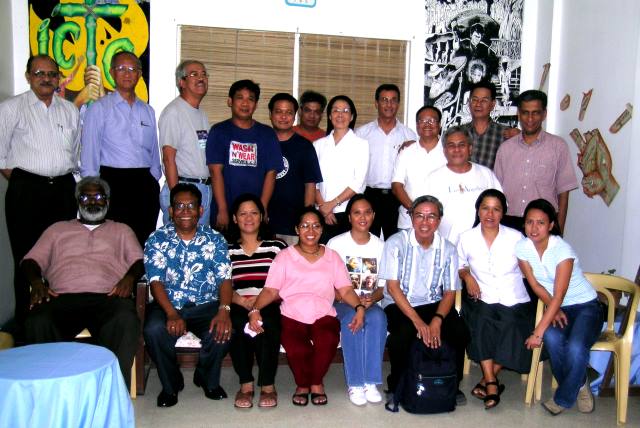
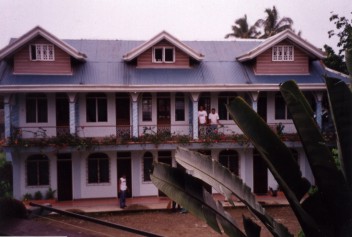 The
Commissariat has five canonically erected houses, 32 solemnly professed
brothers, 14 simply professed and two novices. There are five postulants
and 22 members studying philosophy and another 32 aspirants who wish to
join a Carmelite formation program.
The
Commissariat has five canonically erected houses, 32 solemnly professed
brothers, 14 simply professed and two novices. There are five postulants
and 22 members studying philosophy and another 32 aspirants who wish to
join a Carmelite formation program.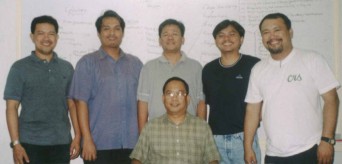
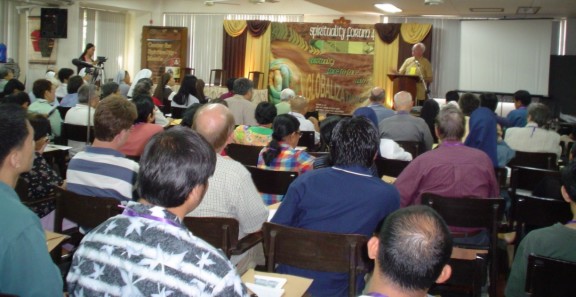
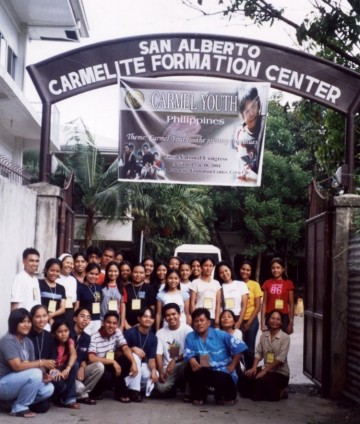 Community
Life
Community
Life